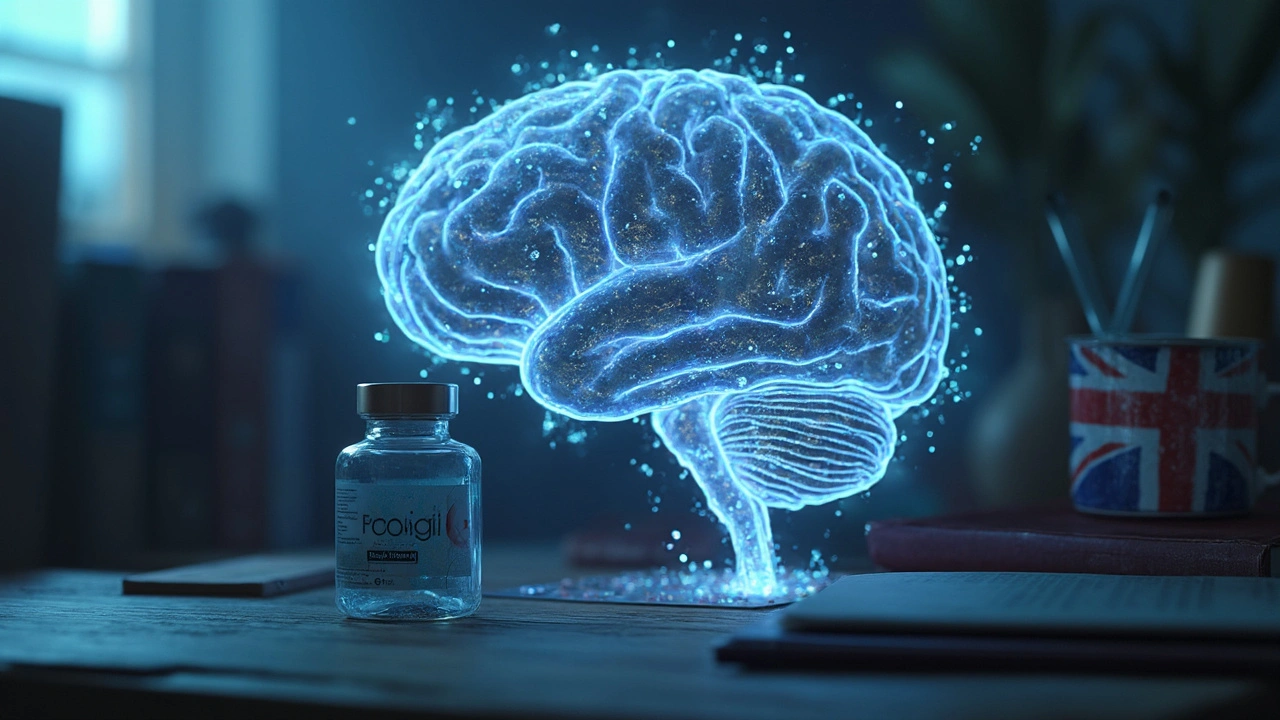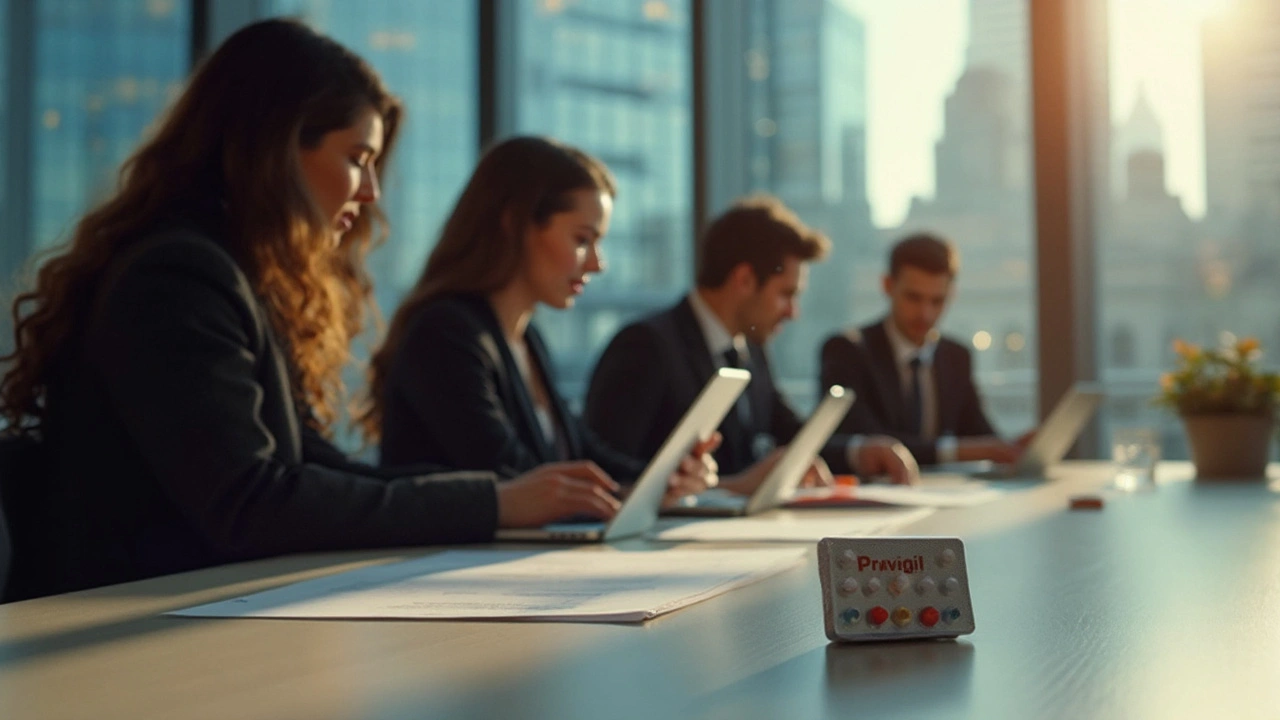If someone told you there’s a pill that could sharpen your focus, keep you awake for hours, and maybe even make you smarter, you’d probably want the details. That’s Provigil, or modafinil if you’re using its generic name. It’s the kind of drug that Silicon Valley execs, tired medical residents, and long-haul truckers whisper about, but it started with a much less glamorous mission—helping people stay awake when their bodies just won’t cooperate. In a world obsessed with squeezing more out of every waking hour, Provigil sits at the crossroads of medicine, ambition, and controversy.
What is Provigil and How Did It Start?
Back in the 1970s, French scientists began tinkering with compounds they hoped would fight sleepy brains. From their experiments, modafinil emerged in the mid-1990s as a treatment for narcolepsy—a rare sleep disorder that packs a real punch. Picture falling asleep in the middle of conversations or during lunch. Modafinil, and its brand-name twin, Provigil, earned FDA approval in 1998 for narcolepsy, later adding shift work sleep disorder and obstructive sleep apnea to its list.
The drug isn’t a classic stimulant like amphetamines or caffeine. It works in a sneakier way, gently tickling various neurotransmitters. Scientists think it bumps up dopamine by blocking its re-uptake (so more lingers in your brain), and it may tap into norepinephrine and histamine as well. The exact recipe is still a bit fuzzy—no one claims to know all the secrets. Provigil doesn’t set your heart racing or leave you jittery. Users often report they feel awake and alert but calm, not wired or twitchy. Pretty appealing, right?
The rise of Provigil wasn’t just about putting folks with narcolepsy back in charge of their lives. Doctors started noticing that it could fight off the brain fog of shift workers and people with chronic sleep issues. The military took notice, too. During the Gulf War, the French Foreign Legion handed out modafinil to exhausted pilots. By the mid-2000s, it was pretty clear: this wasn’t just a medicine—it was an edge.
Who Really Uses Provigil (and Who Probably Shouldn't)?
By prescription, Provigil is still locked into three corners—narcolepsy, obstructive sleep apnea, and shift work disorder. Doctors write these scripts to people whose daytime sleepiness threatens their safety, jobs, or daily sanity. But the story doesn’t end in the pharmacy. Lots of users are young professionals, coders, students, and others who grab Provigil hoping for laser-sharp concentration or deadline-busting all-nighters.
Here’s the thing: not everyone who wants to be sharper or less tired should go for it. If you’ve got a history of heart conditions, high blood pressure, or mental health issues like psychosis, this drug can stir up trouble. One study in the Journal of Clinical Psychiatry showed a higher risk of anxiety and negative mood effects in certain people with bipolar disorder who tried modafinil. And it’s not approved for kids under 17.
The pill’s gray-market life is almost as big as its legal one. Researchers out of Oxford found a third of surveyed college students admitted to trying modafinil or another "smart drug". Some companies test employees for focus-enhancers during exams, making the cultural lines extra blurry. The FDA hasn't approved Provigil for boosting memory, cognitive power, or athletic performance. So if you’re buying it without a diagnosis, you’re in uncharted waters—ethically and legally.
Do people get addicted? Classic addiction signs—cravings, withdrawal, compulsive use—are rare with Provigil, but tolerance can creep up if you use it a lot. Some have a hard time sleeping if they take it too late, which can spiral into restless nights and heavy eyelids the next day, leaving you exactly where you started.

The Real Science: What Does Provigil Do to Your Brain?
Everyone wants to know—does Provigil really make you smarter? Or just less tired? The studies are surprisingly blunt. Modafinil does boost alertness in sleep-deprived folks—pilots, soldiers, and doctors during marathon shifts. A Harvard and Oxford review in 2015 found healthy people saw improvements in attention and learning, but only for certain complex or long tasks. If you’re already fully rested and focused, there’s a limit to how much further you can go.
Modafinil barely moves the needle for simple reaction speed, but it shines in nuanced executive tasks—problem-solving, flexible thinking, or squeezing extra focus out of tired minds. It doesn’t turn you into Einstein overnight but can get you closer to your natural best on a long haul. Here’s a bit of data from a 2010 controlled study:
| Group | Task Completion (Complex) | Reported Side Effects |
|---|---|---|
| Placebo | 78% | 14% |
| Modafinil | 89% | 19% |
A few things stand out. First, the boost is real, but it’s not a superpower. Second, side effects happen: headaches, nausea, dry mouth, and some mood changes are common complaints. According to a 2022 health insurance database, about one in five new users reported mild but annoying side effects in the first week. Rarely, a rash can spiral into Stevens-Johnson syndrome, a medical emergency—definitely not worth risking for an exam.
As with any cheat code, people eventually try to scale up. Some users double down on doses or mix Provigil with caffeine, energy drinks, or even Adderall. Not smart. Combining stimulants can raise heart risks or nudge anxiety into panic. Several respected neurologists have publicly warned about "stacking" drugs for focus. Psychiatrist Dr. Nora Volkow from the National Institutes of Health has stated, "Drugs like modafinil may help in targeted clinical situations, but it’s not a shortcut for a healthy brain."
"The line between therapy and enhancement gets blurry, but the risks are real if we treat prescription drugs like smart candies." — Dr. Nora Volkow, NIH
If you’re thinking of using Provigil as a productivity hack, know that the payoff depends on where you start: the sleepier, foggier, or more distracted you are, the bigger the effect. If you’re healthy, rested, and on your game…well, it’s not going to double your IQ.
Beyond Medicine: Provigil in Everyday Life and Work
This little white pill has traveled far from its roots. Google, Wall Street, and even pro sports have had notorious Provigil moments. Remember the story of chess champ Garry Kasparov popping modafinil during deep tournaments? Or the investment bankers whispering about Provigil right before the 2008 crash? The truth is, lots of folks see it as an investment in themselves, hoping to squeeze a few extra productive hours out of each day. In 2023 alone, global sales of modafinil—both legal and black market—topped $600 million.
To give you a sense of where it’s used most, here’s some recent survey data:
| Field | Self-Reported Provigil Use |
|---|---|
| Tech Industry | 25% |
| Medical Residents | 17% |
| College Students | 31% |
| Business Executives | 10% |
The numbers are high—especially in jobs where deadlines and focus are everything. But it’s not a magic bullet. Some users report a weird flatness—emotions get muted, time passes strangely, or motivation to finish tasks just plateaus. Turns out, hacking your brain comes with quirks, not just clarity.
Then there’s the ethical minefield. Is it fair for one student or analyst to use a smart drug while others slog through caffeine crashes alone? Should workplaces or schools allow—or even require—nootropics on the job? Opinions are polarized. Professors at Stanford and MIT have actually debated if these drugs create a "cognitive arms race." Some companies have written policies outright banning off-label use. The only thing all sides agree on: the line between medical need and everyday pressure keeps getting thinner.
- If you decide to use Provigil, stick to legitimate prescriptions. Black-market pills can be fake or dangerous.
- Always start with the lowest dose—usually 100mg—and avoid mixing with other stimulants.
- Never take Provigil after lunch unless you want to be wide awake at bedtime.
- If you notice rash, hives, fever, or sudden mood changes, stop and see a doctor—these can signal dangerous reactions.
- Keep expectations realistic: you won’t become a genius, but you might become a less tired version of yourself for a while.

The Hype, The Hazards, and What Comes Next
Pop culture loves a smart drug. "Limitless," that Bradley Cooper film about a guy who turns into a hyper-genius, did for modafinil what Red Bull did for taurine. Forums are filled with testimonials and warnings, sometimes two paragraphs apart. A few medical start-ups now offer online “cognitive enhancement” consults, advertising Provigil as *the* way to master modern life. But here’s what most people don’t realize—the research on long-term use is thin. No big studies track what happens to young, healthy brains using it year after year.
Pharmaceutical companies have spent years hunting for even better versions—arModafinil is a newer cousin, and other next-gen drugs are under review. The FDA, for its part, keeps a close eye out for off-label marketing and pushes clinics to be upfront about risks. Some European countries have started to restrict or ban the drug for everyone except patients with diagnosed sleep disorders. Still, the demand keeps rising, fed by people convinced there’s no way back to eight-hour sleep or unplugged weekends.
Want a few pointers? Skip self-medicating. If you still want to boost focus, safe alternatives include exercise, morning sunlight, regular sleep, and less screen time late at night. If you're curious about provigil, talk to your doctor—never trust sketchy forums or secret websites. Genuine medical need should guide you more than hype.
The irony is that the people who squeeze the most out of Provigil are those who use it the least—on the worst nights or the hardest tasks, with medical supervision. The rest of us? Our brains are probably better off with old-school habits—good food, fresh air, solid sleep—than chasing shortcuts that last a day but come with unknown trade-offs for the years ahead.


Write a comment